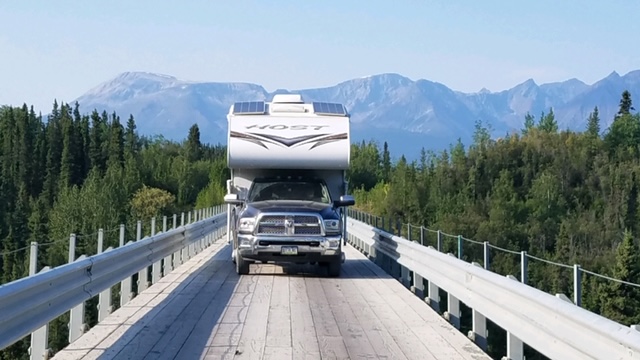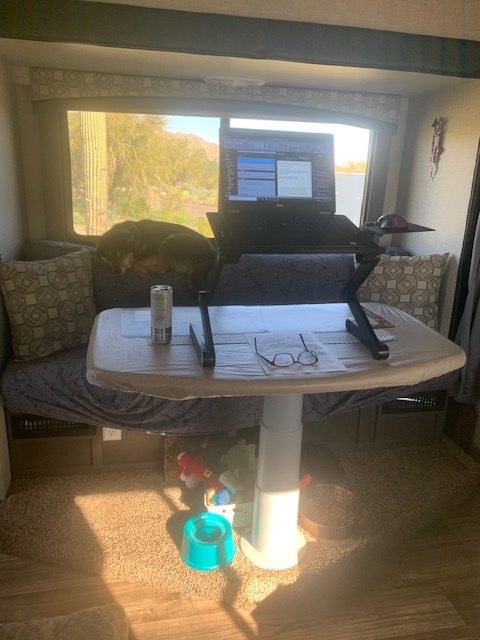How to Translate Existing Skills for Remote Work Success was originally published on www.xscapers.com
One of the key components many of us need to secure in this nomadic lifestyle is identifying work to help support our adventures. There are many professional and trade skills that can adapt and be functional on the road. But did you ever stop and take time to realize many of the skills we all perform every day as an RVer are truly applicable to working remotely? Let us look at some of these skills.
Communication is Key

RVers often have effective communication skills because we naturally meet new people as we travel and explore. It is very common to strike up conversations, answer questions and share experiences of our travels, with others. Whereas others blog, share their trip itinerary/adventures, or provide DIY ideas/suggestions for others to benefit and learn. Communication is a natural skill for Rvers.
In a more traditional workplace your communication often occurs more face-to-face, allowing for both verbal and non-verbal interactions. However, creating an effective way to communicate with your leader, peers, and/or customers must be more intentional for remote employees. Given you are virtual, the work performed is not seen firsthand, therefore you need to share more openly. A few examples of how this may look:
- send out proactive or informational communications in preparation for/of the project, event, or meeting
- include a weekly status or project report sharing details, updates, accomplishments, and any potential risks
- do not only relay on messenger or email, pick up the phone and have phone calls or video chats
Also note that how you articulate and speak is essential as well. Take time to slow down, concentrate and not be distracted – each will help with your success when communicating virtually.
How you interpret or read communications is important when working remotely. At times we can read an email with our own rose-colored glasses or we skim and miss important details, resulting in potential pre-mature, offensive, or defensive responses. Therefore, taking a step back, a walk around the RV, or a re-read an hour later can make all the difference. And finally, any time emotions are racing high – always a good idea to pause, wait, or even sleep on the return message before hitting send or picking up the phone to discuss.
Adaptability and Flexibility Are Important for Remote Work

RVing requires all of us to be adaptable and flexible. As an RVer, we understand that being able to manage change is critical to our lifestyle. We may start out with a plan but at any given point we can encounter issues with our home on wheels, our vehicles, our travel plans, illness, injury, or family needs.
The same is true of working virtually/remotely.
- Often the time zones will be different from your client, prospect, co-worker, or main office. Therefore, adapting to meeting times or being available for key follow-up might be earlier in the day or later in the evening.
- Technology is a key component to our day when working remotely. At times we must be patient, innovative, and creative when utilizing and accessing technical tools. Additionally, having multiple devices such as phone, tablet, and computer or multiple screens may be extremely useful.
- Finally, we are in small places. We need to identify and create workspace that meets our need and allows us to be productive. At times, this may require working outside, in a vehicle, or in other locations such as gazebo, community center or library.
How many times have you adapted or needed to be flexible on your RV journey? Be able to develop a Plan B? I anticipate the answer is “a lot”. The same is needed for working remotely. We can all apply the skills of adaptability and flexibility to remote working jobs and functions.
Planning and Research Can Make All The Difference
Without a doubt, our nomadic life requires some degree of planning and research. May it be to find boondocking or campgrounds, special interests, fun activities, mapping out or securing a safe route, home-schooling children, or managing internet and phone connections.
Working virtually requires planning and research as well. You want to ensure you have the tools, resources, connectivity, and supplies necessary to perform the job functions and tasks.
- If you are a repair specialist or mechanic – you want to have the necessary tools to help your customers,
- if you are a trainer/educator – you want to have the supplies and connectivity to conduct your classes,
- if you perform bookkeeping or accounting – you want the software and tracking necessary to record entries, and
- if you manage and lead teams – you want to ensure you have video/camera, conference line or other means to communicate accordingly.
Planning internet connectivity, shipment receiving or sending, printing demands, access to vendors or stores, or outlining a schedule of availability for conference or video exchanges are all essential to working remotely. And, depending on the work performed, it may be essential to research options, navigate alternatives, and be innovative when identifying solutions.
Welcome to the world of nomadically living, right? We truly can take these skills and translate/apply them to our remote offices, tasks, and functions.
Digital and Technical Skills are Necessary for Remote Work

Without a doubt working remotely will involve some form of digital and or technical tools and resources. Technology and digital footprint solutions can truly enhance, secure, and improve virtual business operations.
Learning these skills (self-taught or classroom) is worth the investment of time and money. Utilizing applications, phone, conferencing/video, team chat, shipping, purchasing, invoicing, or compliance/regulatory functions is inevitable. Equipping yourself with the necessary tools, resources and technology is a key first step when working remotely.
If you work for an employer, they will often supply and or provide these items. When self-employed, you will want to plan and budget for such items as part of your business operations and planning.
Consider all the apps, social media groups, and resources we access and utilize as RVers. Just as we rely upon our fellow RVers for information on “what to” and “how to”; we can do the same with our remote work tasks and functions.
Many fellow RVers work full time and are completely willing to share what works for them, while working on the road. We all need to take advantage of technology to meet, engage, and maximize our remote functions. If technology or online functions are challenging for you today – there are many webinars, books and resources to enhance, grow and obtain skills. It would be a great investment to enhance knowledge and experience with specific software packages, industry designated applications, search engine optimization/tools, and eLearning courses available.
Networking as an RVing Remote Worker
Working remotely requires us to network and share what it is we do with others that we meet – especially if you are self-employed, launching a new business, or require a specific customer/buyer for your product/services.
This is where having business cards, website, social media forums or blog can really enhance your messaging and awareness. Networking, sharing ideas, and building a connection with those who compliment, enhance, and/or relate to your work skills will be extremely helpful and beneficial. At a recent convergence, several bookkeeping/accountant skilled members met and shared ideas and information with one another. You want to create more of these exchanges. Be willing to open the door and ask, “What do you do?”
As RVers, especially associated with Escapees/Xscapers, some of the best ways to share your business or skills is through smaller group conversations, social outings/events, presenting on a topic or writing an article. You want to take advantage of the social media conversations where/when you can post links or information about your business or specialty. Maximize campfire, lot crawl or small group event discussions. Do not forget to listen to your fellow RVers, hear what their experiences/challenges/needs might be and follow up when you can make a connection or fulfill that need. Our community of RVers are the most kind, helpful and caring individuals. Networking can truly open doors for your business and or position.
How to Pitch the Remote Work Idea to Your Current Employer
- First, take a good inventory of your skills, strengths, and expertise. Be prepared and able to discuss, emphasize and articulate them clearly. And if needed, consider options to improve or enhance areas of growth and development.
- Second, know the job functions performed today. Consider and evaluate how functions are completed and what challenges might exist if performed remotely. Evaluate options to overcome those questions or challenges.
- Third, conduct research and planning before discussing with your direct supervisor. Propose a part-time or scheduled approach to moving to working remote. An example may be to start with 1,2 or 3 days a week, on a trial basis. Remember to consider who your customers or internal/external team members are and how/if they are impacted.
- Finally, present your plan to include what, when, how and why. Share benefits for both sides; you and the company. Identify challenges proactively and discuss solutions/considerations. If there are cost savings, be prepared to speak to those as well.
Regardless if you are in a profession, a trade, self-employed or working for an employer; so many job functions can be performed successfully remotely.
In my 23 years of experience of working remotely, it comes down to utilizing, sharing, and maximizing your skills. It is about being responsible, dependable, and reliable. It includes communicating timely, effectively and efficiently.
Remember to adapt and be flexible – not flat on your feet. Be innovative and creative, think outside norms. Plan, research and use technology/tools to enhance your skills and job competencies. Plus use them to improve and maximize business operations. But most importantly…share and network whenever possible.
And, the best part of all of this…so many of the skills needed/learned to live nomadically, in our homes on wheels; directly corresponds to and relates to working remotely! We all can apply our RVer skills to our new or current remote job functions.


Author
Wendy S. Kadner
Wendy is a senior executive in the healthcare, technology, and consulting industries. With over 23 year of remote work experience, she has also served on hospital boards, and developed a non-profit pet rescue.
Originally from Iowa, Wendy travels full-time in her truck camper with her 2 pups. She enjoys the Southwest and Pacific Northwest and spends most of her time in these areas. As a solo traveler, Wendy enjoys meeting new people, experiencing local favorites, visiting famers markets and cooking in her truck camper home. “Learning about Escapees/Xscapers just 16 months ago has been the best thing ever in my travels. I have truly found my community of friends on the road.”



